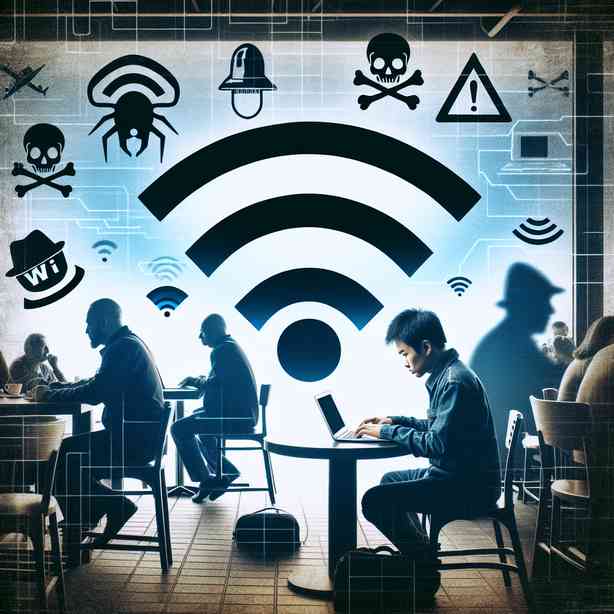
Using public Wi-Fi can be incredibly convenient, allowing you to connect to the internet while you’re on the go. However, it’s essential to recognize the potential risks associated with these networks before you jump onto one. In this article, we will explore the reasons why you should never trust public Wi-Fi.
When you connect to a public Wi-Fi network, you often do so without giving it much thought. Airports, cafes, hotels, and other public spaces frequently offer free Wi-Fi as a lure for customers. While this may seem harmless, it’s important to understand that these networks can be a hotbed of cybercriminal activity. Public Wi-Fi networks are often less secure than private networks, making them easier targets for hackers.
One of the primary dangers of public Wi-Fi is the ease with which cybercriminals can intercept your data. When you log onto a public network, your information may be transmitted without encryption, leaving it open for anyone with the right tools to capture it. This means that sensitive information, including login credentials, credit card numbers, and personal messages, can be stolen by malicious actors. Even if a network is secured with a password, it may not provide adequate protection against attackers who are determined to gain access.
Moreover, there is a deceptive practice known as “rogue hotspots.” This occurs when a hacker sets up a fake Wi-Fi network that mimics a legitimate one. Unsuspecting users may connect to this rogue hotspot, believing they are using the legitimate network, and as a result, expose their data to the hacker. This highlights the importance of verifying the legitimacy of any public Wi-Fi network before connecting. Always ask staff for the correct network name and be wary of networks that have generic names such as “Free Wi-Fi” or “Public Internet.”
Another element to consider is the possibility of man-in-the-middle attacks. In this scenario, an attacker intercepts the communication between your device and the internet. This could happen when you access your bank account or enter your personal information on a shopping website. The attacker can capture everything you send and receive, putting your online security at considerable risk. To safeguard against this, using a Virtual Private Network (VPN) can help encrypt your data, making it significantly harder for attackers to intercept.
Furthermore, even if you’re not actively entering personal information, your device may still be sending and receiving data that could be valuable to someone with malicious intent. Without a VPN, your online activities can be monitored, revealing your browsing habits and preferences that you might want to keep private. A VPN not only encrypts your traffic but also masks your IP address, adding an extra layer of anonymity while you’re connected to a public network.
It’s also important to be cautious about what you choose to do while connected to public Wi-Fi. For instance, you should avoid accessing sensitive accounts such as online banking or making purchases that require you to enter your credit card details. If you must conduct sensitive transactions, it’s prudent to do so only over a secure, private connection, such as your home Wi-Fi or a mobile data plan.
Security settings on your device can also play a crucial role in protecting you while using public Wi-Fi. Ensure that your device’s firewall is enabled and that your antivirus software is up to date. Some devices may have a setting that automatically connects to available Wi-Fi networks; it’s best to disable this feature to prevent unintentional connections. By taking personal responsibility for your device’s security settings, you can mitigate some of the risks associated with using public Wi-Fi.
In addition to technical precautions, you should remain vigilant about the types of information you share online when using these networks. Be cautious about what details you provide when signing up for services or logging into accounts, especially if you are unsure about the security of the network. If possible, maintain a habit of checking for HTTPS in the URL bar when entering any sensitive information, as this indicates that the website is secured through encryption.
Lastly, let’s not forget about post-usage habits. After using public Wi-Fi, it is smart to review your device’s connected apps and permissions. Ensure that no unauthorized applications have accessed your information during your session. Regularly changing your passwords and monitoring your accounts for any unusual activity can also go a long way in protecting your personal information.
In conclusion, while public Wi-Fi offers undeniable convenience, it also comes with significant risks that shouldn’t be overlooked. The ease with which cybercriminals can exploit these networks makes it essential to approach them with caution. By following best practices, like using a VPN, enabling security settings, being mindful of the information you share, and maintaining vigilant after-use habits, you can help secure your online presence even when using these potentially dangerous networks. The most effective strategy is always to prioritize your security and privacy, avoiding risky situations whenever possible. By doing so, you can enjoy the conveniences of public Wi-Fi with a much greater level of safety.


